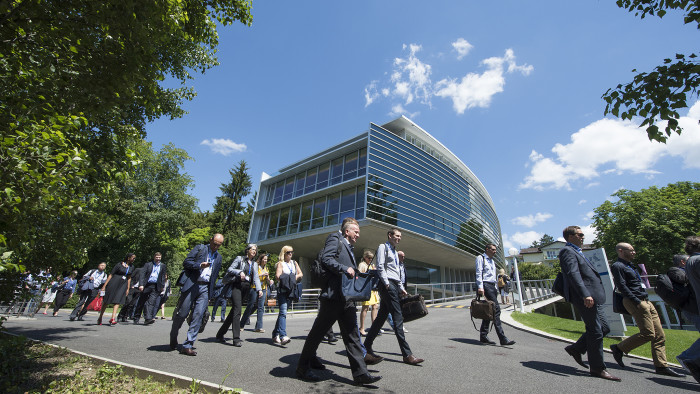Business school: Executive courses ranking, tidy desks, GMAT/GRE

Simply sign up to the Business education myFT Digest -- delivered directly to your inbox.
Welcome to the FT Business school newsletter, a weekly serving of management wisdom, reading recommendations and business-related challenges. FT subscribers can sign up here to receive the newsletter by email every Monday. If you have feedback about FT Business school, please email bschool@ft.com.
Executive Education rankings 2018
Find out which business schools are in our ranking of executive customised and open-enrolment courses . Is your school in the list? Also, take a look at our free-to-read Executive Education ranking special report. Find out what Shakespeare can teach Facebook's Mark Zuckerberg about drama and why MBA graduates are going back to business school.
Bracken Bower Prize: do you have a business book idea?
The FT and McKinsey have launched the 2018 Bracken Bower Prize for young would-be business book authors. The £15,000 award, now in its fifth year, will go to the best proposal for a business book about the challenges and opportunities of growth by an author, or authors, under the age of 35.
The prize’s 2014 winner was Saadia Zahidi, whose book Fifty Million Rising, about the new generation of Muslim women entering the workforce, was published in January. For further details and to register your interest in entering this year’s prize, visit FT Live.
Andrew Hill's challenge
The FT's management editor sets a weekly test of your business, strategy and management skills.
I've been on the road researching a long analysis about productivity and en route I came across the old 5S system for bringing order to disorderly production lines. My column examines the Japanese-inspired system , which helps workers to organise and tidy their workspace for greater efficiency with the mantra Sort, Set in Order, Shine, Standardise and Sustain.
Fellow columnist Tim Harford has written about how this sort of lean organisation fails when it comes to the office. Workers who are allowed to organise and decorate their workspace are more productive than those obliged to keep it neat. Still, plenty of people have "systems" for maintaining order. This week's challenge is to summarise in a sentence your tip or tips for organising your work: is it paper files, electronic lists, or a clever way of tricking your mind to be more efficient? Send your ideas to bschool@ft.com .
Last week, I asked for ideas about how to avoid the dangers of "data-think", a dangerous over-reliance on data. Thanks for many insightful responses. Renato Salud provided a few, of which I liked is this data-based version of the "devil's advocate": "Today, for every data [set] there [are] counter/opposite data. Assemble two opposing sets of data and challenge them to reconcile or find common ground." But I also liked this strictly analogue suggestion to pin up posters in all meeting rooms with the timeless reminder: "Not everything that can be counted counts and not everything that counts can be counted."
This week's further reading is a cut-out-and-keep list, from Valuer website, of "50 Corporations that Failed to Innovate" , from Hitachi to Polaroid. It's a sometimes controversial group — IBM and GM would probably dispute their inclusion — and as interesting for the companies that survived as those that disappeared. Usefully, Valuer includes links to in-depth analyses of the case studies.
Professor's picks
Every week a business school professor or academic recommends useful FT articles.
Wolfgang Ketter, professor of information systems at the University of Cologne Business School selects:
Oil majors can give birth to green energy businesses The article says that the shift required to respond to ‘’the current energy transition to a low carbon world’’ is “’different from any previous change and will need a radical approach".
Traditional energy giants are quite conservative in their approach to change and risk. The question is how can we align changes in policy, business models, and technology to hasten the move towards less carbon without encountering serious problems with reliability and affordability of energy, which is itself a driver of the economy.
Students interested in energy should note: “the organisational structures of the energy businesses” are also in transition. ”In these circumstances, rigidity is the enemy of progress.”
Jonathan Moules's business school news
These are testing times for the administrators of business school entrance exams. The Graduate Management Admission Council (GMAC), the longstanding leader in MBA applicant testing, last month trimmed its GMAT exam to make it shorter than arch-rival GRE. GMAC says the point is to streamline the test. Many observers conclude that it is a sign of increasing competition between the two exams.
GMAT’s lead in business school applications seems secure – the GRE is more widely used because it covers all forms of graduate school places. Several top schools will only accept the GMAT in applications unless taking the test is impossible in the country where the applicant is based. However, is structured testing the best way to find good MBA candidates? What about the other mainstay of business school applications, the essay question? Should that be replaced?
Research by CarringtonCrisp found a fifth of potential applicants would rather not take a test at all — and would be willing to find schools that do not require them to take a formal entrance test. The report did not ask them what they think would be a better test of their potential as an MBA student. If you think you have a solution to this problem, do email me, on jonathan.moules@ft.com .
Ask the academics
Got a question for leading business school experts? Send it to bschool@ft.com and we will publish the best replies in future newsletters.
Test your knowledge
How good is your grasp of the news? Test your reading of last week's top stories with the FirstFT quiz.
Edited by Wai Kwen Chan — bschool@ft.com
Comments